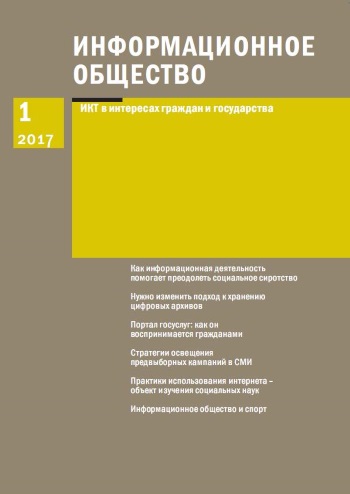|
 In the rubric "Fundamental Research in the field of
Information Society" there is an article by Candidate of Historical Sciences Eugeniy Pleshkevich "Documentary and Information Component of the Modern Society" in which the author analyzes the
organization of the documentary and information segment of modern society. In the rubric "Fundamental Research in the field of
Information Society" there is an article by Candidate of Historical Sciences Eugeniy Pleshkevich "Documentary and Information Component of the Modern Society" in which the author analyzes the
organization of the documentary and information segment of modern society.
Further Andrey Korenyuk
proves in his article "Information Activity as a Means of Overcoming
Social Orphanhood", that "the mass
media, including the Internet, are the most important source and way of forming
public opinion. Thanks to their activities, the public, businesses and other structures can be involved in solving the problem
of social orphanhood."
The article by Victoria Prozorova, Candidate of Historical
Sciences, is devoted to long-time preservation of digital records. Further, in
the article of researchers from the St. Petersburg National Research University
of Information Technologies, Mechanics and Optics Dmitry Brazevich, Victor
Vasilenok, Anna Gerasimova and Irina Tolstikova the evolution of the world
blogosphere as a special information and communication space providing new
social opportunities and prospects is analyzed. It
is argued that the global blogosphere is developing as a new public sphere, a
special form of personalized journalism and business, a discussion platform for
discussing topical social, political and economic problems.
The article by Candidate of
Sociological Sciences Aleksandr Yefanov discusses a strategy for covering
the election campaign in mass media from the viewpoint of their impact on
electoral interest. The research objects are electoral processes in Russia and
United States of America in 2016. The studies were conducted with the use of materials
from news, several public and political programs on federal and regional TV
channels, as well as posts made by Orenburg region residents on social
networks. The applied methods were quantitative content analysis and discourse
analysis.
The article by Evgenia
Petrova from Higher
School of Economics focuses on the research of the Common Government Services
Portal (CGSP) in the paradigm of the anthropological method. The empirical base
was collected in Rostov-on-Don (Russia) in 2016. The findings of the study help
to expand the understanding the citizens’ perception of CGSP and the practices
of using the Portal in daily life. The article by Volchenko
Olesya reviews approaches towards measuring practices of Internet use and
highlights major pros and cons of described indicators. The examples of
research questions addressed using different indicators are also provided. All
instruments are classified into macro-indicators that allow describing Internet
penetration in a country or a region and micro-indicators that allow estimating
frequency of Internet use by individuals. Micro-indicators can also be
classified into indicators based on automatically collected data and indicators
based on survey data.
And
finally the
article by Valery Kostikov analyzes the peculiarities of sport as a substantive
sphere with its system of values, which are integrated in the development of
the society, highlights the typological features of sport as a cultural
phenomenon, presents models of modern social and cultural projects. |

